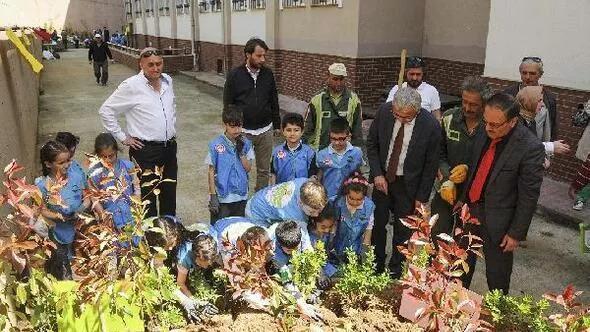
The Turkish Education Ministry has launched a major eco-friendly and zero-waste focused project aimed at enabling schools to generate their own electricity from solar power, including setting up libraries built with recycled materials.
The project, which aims to promote environmental awareness among students, is already bearing fruits. To date, 525 eco-friendly libraries have been set up in schools and authorities are planning to build such facilities in at least one of the lifelong learning centers in the country’s all provinces.
This is part of the Education Ministry’s “No Schools Without Libraries,” initiative. The first of those eco-friendly libraries opened in the Erol Parlak Fine Arts High School in the eastern province of Ağrı.
Old and unused desks, computer components, musical instruments and textile materials were recycled under the “Zero Waste” project and turned into new desks, bookshelves, chairs and lighting units to be used in the school’s new library.
The idea of building libraries with recycled materials emerged out of the wider Zero-Waste project, Education Minister Mahmut Özer said.
“No Schools without libraries” project, which was launched by first lady Emine Erdoğan, was finalized in December 2021.
Under the scheme, new libraries opened in more than 16,000 schools in the country. Before the project, school libraries contained 29 million books, but their number increased to more than 56 million after new libraries were launched.
Clean energy at schools
Apart from the library initiative, the Education Ministry is also conducting a major project dubbed “Eco-Friendly 1,000 Schools” in cooperation with the Environment, Urbanization and Climate Change Ministry.
For the scheme, the ministry identified 1,000 schools, elementary schools across the country.
The project foresees that the selected schools will meet their energy consumption with solar energy panels, turn waste collected from refectories into compost fertilizer which will be used to grow flowers and use rainwater at their facilities.
As part of this green initiative, the Education Ministry added environmental education and climate change lessons to the schools’ curriculum.
In fact, the seventh and eighth graders had been taking classes on the environment since 2015, but the ministry updated that syllabus and changed the name of the course to environmental education and climate change.
In the next academic year, this course will be introduced to sixth, seventh and eighth graders to teach them about zero-waste.